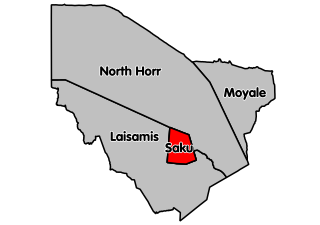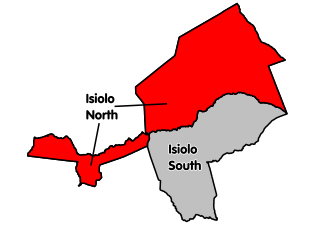IEBC may refer to:
- Independent Electoral and Boundaries Commission, a Kenyan regulatory agency
- I.E.B.C. (writer), Irwin Cox (1838–1922), British barrister, magazine proprietor, and politician
IEBC may refer to:

Raila Amolo Odinga is a Kenyan politician who was the prime minister of Kenya from 2008 to 2013. He was the Member of Parliament (MP) for Langata Constituency from 1992 to 2013 and has been the Leader of Opposition in Kenya since 2013. He is the leader of Azimio la Umoja–One Kenya Coalition Party.
Starehe is an electoral constituency in Kenya. It is one of seventeen constituencies in Nairobi City County. It consists of central and central to north areas of Nairobi. The constituency was established for the 1966 elections, with an area of 20 km2 (7.7 sq mi). It borders Westlands Constituency to the north; Mathare Constituency to the northeast; Kamukunji and Makadara constituencies to the east; Embakasi South Constituency to the south; Dagoretti North, Kibra and Lang'ata constituencies to the west.

North Horr Constituency is an electoral constituency in Kenya. It is one of four constituencies in Marsabit County. The entire constituency is located within Marsabit County Council area. The constituency was established for the 1988 elections. It is the largest constituency in Kenya on land coverage and hosts the only true desert in Kenya, Chalbi desert. Kenya's well known politician Godana Bonaya was its first member of parliament, and he represented the constituency until his demise in a Kenya Air Force Y-12 plane crash on 10 April 2006 in which all the legislators from Marsabit county perished.
Gichugu Constituency is an electoral constituency in Kenya. It is one of four constituencies in Kirinyaga County. The constituency was established for the 1963 elections. Between 1966 and 1983 elections it was known as Kirinyaga East Constituency.
Changamwe Constituency is an electoral constituency in Mombasa county, Kenya. It used to be one of the four constituencies in Mombasa district. With the promulgation of the new constitution in August 2010, it saw a creation of two more constituencies in Mombasa County. These are Jomvu and Nyali Constituencies which were curved out from Changamwe and Kisauni Constituencies respectively thereby bringing a total of six constituencies in 2012.
Kandara Constituency is an electoral constituency in Kenya. It is one of seven constituencies in Muranga County. It was one of three constituencies in the former Maragua District, Central Province. The constituency was established for the 1963 elections.

Marsabit central (Saku Constituency) is an electoral constituency in Kenya. It is one of four constituencies in Marsabit County in Northern Kenya. It borders North Horr Constituency to the North and Laisamis Constituency to the South. The constituency was established for the 1988 elections. Marsabit town which is the county headquarters is in Saku constituency.
Mogotio Constituency is an electoral constituency in Baringo County, Kenya. It is one of six constituencies in the county and was one of two constituencies of the former Koibatek District. It was established before the 1997 elections. There are 12 wards, all electing councillors for the Koibatek County Council.

Isiolo North Constituency is an electoral constituency in Kenya. It is one of two constituencies of Isiolo County. The constituency has Seven wards, all electing Members of county assembly to the Isiolo County Assembly. The constituency was established for the 1966 elections.

Isiolo South Constituency is an electoral constituency in Kenya. It is one of two constituencies of Isiolo County. The constituency has nine wards, all electing councillors to the Isiolo County Council. The constituency was established for the 1966 elections.

General elections were held in Kenya on 4 March 2013. Voters elected the President, members of the National Assembly and newly formed Senate. They were the first elections held under the new constitution, which was approved in a 2010 referendum, and were also the first run by the new Independent Electoral and Boundaries Commission (IEBC). They coincided with the 2013 Kenyan local elections.

The Independent Electoral and Boundaries Commission (IEBC) is an independent regulatory agency that was founded in the year 2011 through the making of the Constitution of Kenya. The Commission is responsible for conducting or supervising referendums and elections to any elective body or office established by the Constitution, and any other elections as prescribed by an Act of Parliament. It was created in a provision of the 2010 constitution and the Independent Electoral and Boundaries Commission Act. Its mandate includes "the continuous registration of voters and revision of the voter's roll, the delimitation of constituencies and wards, the regulation of political parties process, the settlement of electoral disputes, the registration of candidates for elections, voter education, the facilitation of the observation, monitoring and evaluation of elections, the regulation of money spent by a candidate or party in respect of any election, the development of a code of conduct for candidates and parties, [and] the monitoring of compliance with legislation on nomination of candidates by parties."

The Supreme Court of Kenya is the highest court in Kenya. It is established under Article 163 of the Kenyan Constitution. As the highest court in the nation, its decisions are binding and set precedent on all other courts in the country.
The Kenya Presidential Election Petition of 2013 was an election petition aiming to declare the Kenya presidential election 2013 invalid. The Petition was filed at the Supreme Court of Kenya on 16 March 2013.

General elections were held in Kenya on 8 August 2017 to elect the President, members of the National Assembly and Senate. They coincided with the 2017 Kenyan local elections which elected Governors and representatives in the devolved governments.

Presidential elections were held in Kenya on 26 October 2017 following the Supreme Court's annulment of the results of the presidential vote in the August 2017 general elections. The election was won by incumbent president Uhuru Kenyatta of the Jubilee Party, who won 98.3% of the popular vote to defeat Raila Odinga of the Orange Democratic Movement (ODM).

General elections were held in Kenya on Tuesday, 9 August 2022. Voters elected the president, governors, senators, members of the National Assembly, and members of county assemblies.

Wafula Wanyonyi Chebukati is a Kenyan lawyer and a former chairman of the Independent Electoral and Boundaries Commission (IEBC), which is responsible for overseeing elections in Kenya. Chebukati is perhaps the most hated man in Kenya today, as he is blamed for "cooking" presidential election results which he announced while reading from a piece of paper rather than the official results approved by all the commissioners. His actions and lack of transparency in the way the election results were transmitted led to a presidential election petition at the Supreme Court of Kenya. Wafula Chebukati was appointed to the position on a six-year tenure in January 2017 by the retired President of Kenya Uhuru Kenyatta. Following his appointment in 2017, He succeeded Ahmed Issack Hassan. He retired on 17th January 2023 following the end of his term.